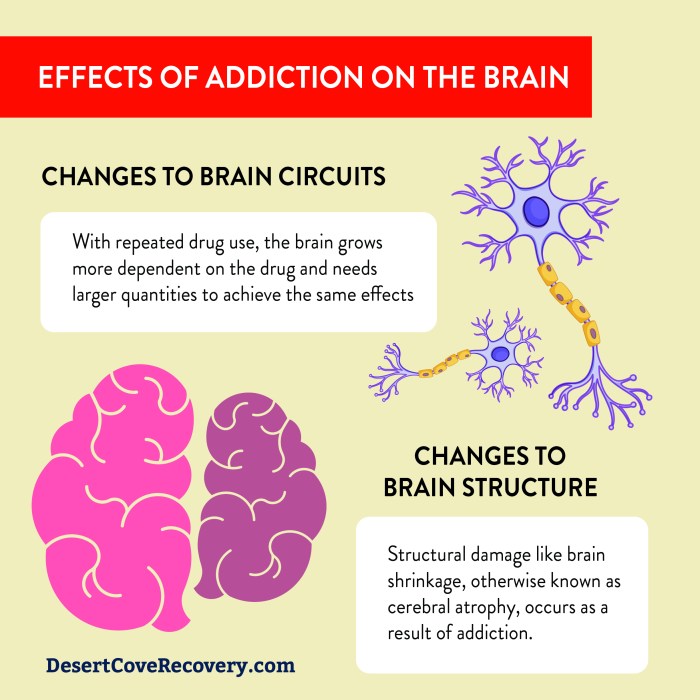The brain is susceptible to addiction weegy. This susceptibility is rooted in the intricate neurobiological processes that underlie addiction. The brain’s reward pathways, in particular, play a pivotal role in the development and maintenance of addictive behaviors. Over time, addiction leads to significant changes in brain structure and function, impacting cognitive abilities, memory, and decision-making.
Various factors, including genetic predispositions, environmental influences, and psychological traits, can increase an individual’s vulnerability to addiction. The brain’s developmental stages also shape this vulnerability, with adolescence being a particularly sensitive period. Life experiences, such as exposure to trauma or stress, can further contribute to addiction risk.
Addiction and the Brain: The Brain Is Susceptible To Addiction Weegy

Addiction is a complex brain disorder characterized by compulsive drug-seeking and use, despite negative consequences. It involves intricate neurobiological processes that alter brain structure and function.
Neurobiological Processes Underlying Addiction
Addiction involves the activation of the reward pathway, a network of brain regions that reinforces pleasurable experiences. When a person uses drugs, the drug stimulates the release of dopamine, a neurotransmitter associated with pleasure and reward. This positive reinforcement strengthens the association between drug use and reward, leading to increased drug-seeking behavior.
Role of Reward Pathways in Addiction
The reward pathway plays a crucial role in addiction by providing positive reinforcement for drug use. Dopamine released in the nucleus accumbens, a key brain region in the reward pathway, signals the brain that the drug experience is pleasurable. This reinforcement strengthens the association between drug use and reward, leading to increased drug-seeking behavior.
Changes in Brain Structure and Function Associated with Addiction, The brain is susceptible to addiction weegy
Addiction leads to structural and functional changes in the brain. Chronic drug use can alter the structure of the prefrontal cortex, a brain region involved in decision-making and impulse control. It can also impair the functioning of the hippocampus, a brain region involved in memory and learning.
These changes contribute to the compulsive drug-seeking and use characteristic of addiction.
Popular Questions
What are the key neurobiological processes involved in addiction?
Addiction involves the activation of reward pathways in the brain, leading to the release of dopamine and other neurotransmitters. Over time, repeated exposure to addictive substances or behaviors alters these pathways, making individuals more susceptible to addiction.
How does addiction affect brain structure and function?
Addiction can lead to changes in brain regions involved in reward, motivation, and self-control. These changes can manifest as reduced gray matter volume, impaired connectivity, and altered neurotransmitter activity.
What factors increase an individual’s vulnerability to addiction?
Genetic factors, environmental influences (e.g., exposure to trauma or stress), and psychological traits (e.g., impulsivity, sensation-seeking) can all contribute to an increased risk of addiction.
How does addiction impact cognitive function and decision-making?
Addiction can impair cognitive abilities, including attention, memory, and executive function. It can also affect decision-making processes, leading to poor choices and increased risk-taking behaviors.


